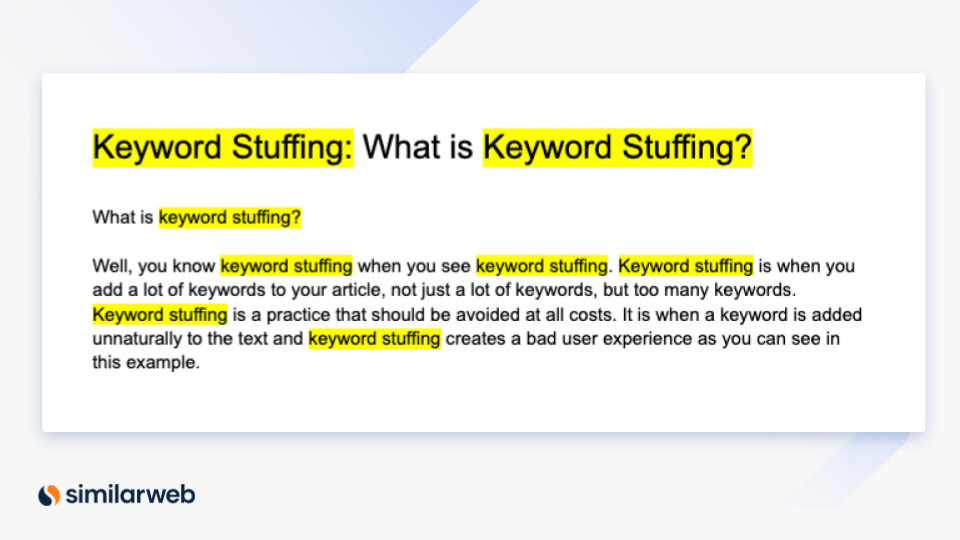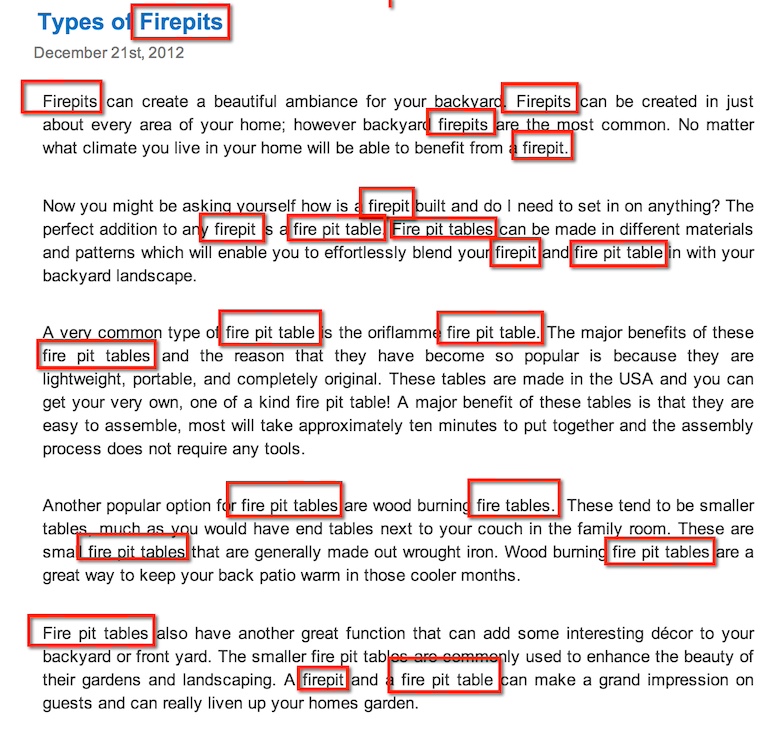Hi, Dave from Starscape SEO here.
I’ve been in the SEO business long enough to remember when it seemed like a great idea to cram as many instances of a certain keyword into a website blog article or review post as humanly possible, just to get Google’s attention and possibly move up in the ranks.
Keyword Stuffing – Google’s Big No-No
This practice I’ve just mentioned was and still is called “keyword stuffing”.
These days, this practice of unnaturally inundating readers or users with a specific keyword in order to attempt to manipulate search rankings can get Google to give your blog post (and even your entire website) a higher spam score.
At that point, Google will do its best to make sure that your article will never be seen in the search engine results pages (SERPs) ever again.
If your keyword stuffing ways get bad enough, along with other practices that Google doesn’t like, you can potentially (worst case scenario) incur a manual penalty from Google that ensures you are removed from Google entirely. Trust me, it CAN happen.

The Way It Used To Be – Spam Everywhere!

This practice wasn’t always seen as being such a bad thing, even though most online marketers like me were used to seeing it and so I personally became a bit numb to it.
In fact, it was once a popular strategy to improve visibility on search engines (it actually did help you rank, say, 15 years ago), but it has since fallen out of favor due to advancements in search engine algorithms, and the fact that it just looks weird and unnatural.
Keyword stuffing isn’t just limited to inserting keywords unnaturally into content, but it also extends to meta tags, and alt text in a way that disrupts the readability and user experience.
For example, if a page is about “organic gardening tips,” and it repeats the phrase “organic gardening tips” multiple times in a way that feels forced or unnatural, it would be considered keyword stuffing, by Google’s robots, that are checking your web pages periodically and deciding if it’s good content or spam.
Google’s Commitment To A Better User Experience

Google’s dislike for keyword stuffing stems from its commitment to delivering the best possible search experience for its users.
Over the years, Google has refined its algorithms to better understand the intent behind search queries and the quality of the content that matches those queries.
The goal is to provide users with the most relevant, helpful, and trustworthy information available.
When a webpage engages in keyword stuffing, it often sacrifices the quality and readability of its content in favor of trying to game the system.
This results in a poor user experience, as the content can become repetitive, awkward, and difficult to read.
Rather than offering value, keyword-stuffed content tends to prioritize search engine rankings over user satisfaction. Google recognizes that such practices do not align with its mission to serve users the most pertinent and meaningful content.
How Google Dissuades Keyword Stuffing

To combat this, Google has implemented sophisticated algorithms that can detect when a page is over-optimized with keywords.
These algorithms assess not just the presence of keywords, but also how they are used in context. If a page is found to be engaging in keyword stuffing, it can be penalized, leading to lower rankings in search results or even complete removal from Google’s index.
By penalizing keyword stuffing, Google encourages website owners and content creators to focus on producing high-quality, user-centric content. The emphasis is on writing naturally, using keywords in a way that enhances the content rather than disrupts it.
This approach not only improves the user experience but also aligns with Google’s broader strategy of rewarding websites that genuinely meet the needs of searchers.
In essence, Google’s disdain for keyword stuffing is rooted in its dedication to promoting content that is both useful and engaging, ensuring that search results remain relevant and valuable to users.
Business Risk

Keyword stuffing isn’t just a poor SEO practice; it’s a business risk. When you stuff keywords into your content, search engines like Google notice, and the penalties can be severe.
Lower rankings are just the beginning—your website could lose significant visibility on search engine results pages (SERPs). This drop in visibility means fewer people will find your business online, leading to less exposure.
Without exposure, your chances of attracting new customers diminish rapidly.
In today’s digital marketplace, where most consumers start their purchasing journey with a Google search, being hard to find is a major disadvantage.
Every lost click is a missed opportunity to connect with potential customers, showcase your products or services, and build your brand.
Less exposure directly impacts your bottom line.
When your site is buried deep in search results, your competitors—who are likely focusing on quality, user-friendly content—get the clicks, the leads, and ultimately, the sales that could have been yours.
Over time, this loss of potential customers can lead to a significant decrease in revenue.
In essence, keyword stuffing harms not just your SEO efforts, but your overall business success.
It leads to fewer opportunities to engage with customers, less traffic, and ultimately, fewer conversions and sales.
For businesses looking to grow and thrive online, focusing on creating valuable, high-quality content is the key to gaining visibility, attracting customers, and driving revenue.
Wrapping Up
In summary, keyword stuffing is an outdated SEO tactic that can harm a website’s search rankings.
To achieve sustainable SEO success, it’s essential to focus on creating valuable, engaging content that resonates with your audience and adheres to best practices in keyword usage.

Call or Text Starscape SEO: (519) 208-8680


